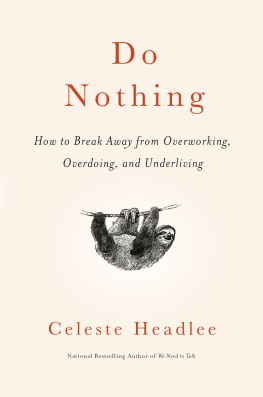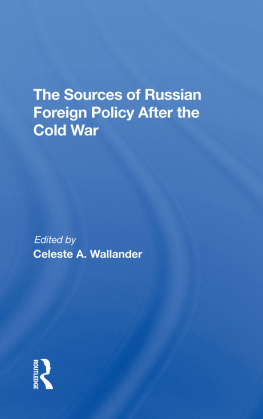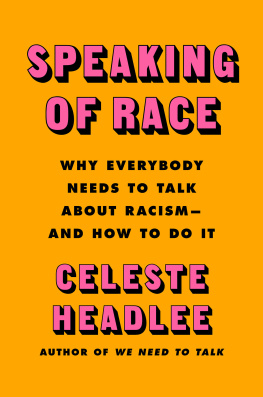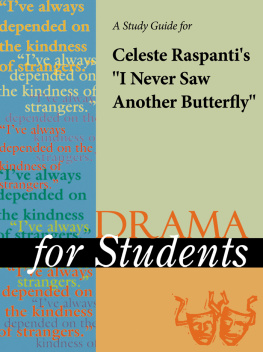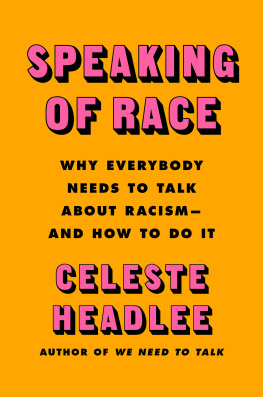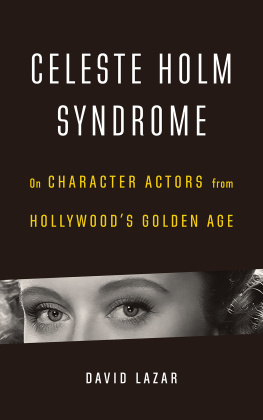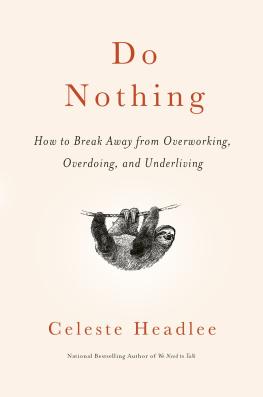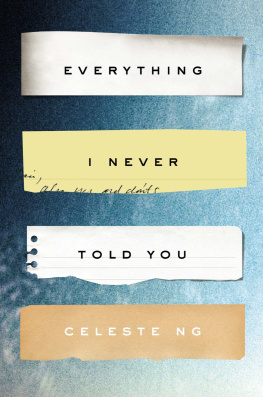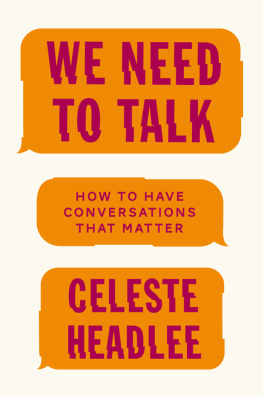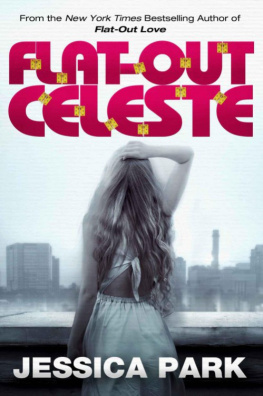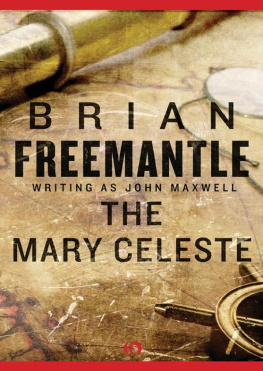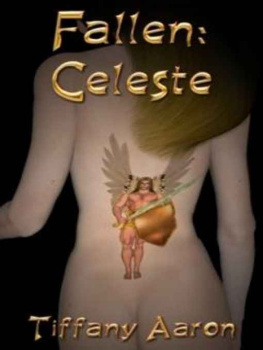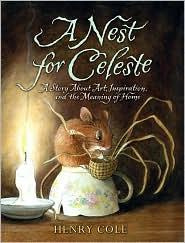Celeste Anne Headlee - Do nothing : how to break away from overworking, overdoing, and underliving
Here you can read online Celeste Anne Headlee - Do nothing : how to break away from overworking, overdoing, and underliving full text of the book (entire story) in english for free. Download pdf and epub, get meaning, cover and reviews about this ebook. year: 2020, genre: Romance novel. Description of the work, (preface) as well as reviews are available. Best literature library LitArk.com created for fans of good reading and offers a wide selection of genres:
Romance novel
Science fiction
Adventure
Detective
Science
History
Home and family
Prose
Art
Politics
Computer
Non-fiction
Religion
Business
Children
Humor
Choose a favorite category and find really read worthwhile books. Enjoy immersion in the world of imagination, feel the emotions of the characters or learn something new for yourself, make an fascinating discovery.
- Book:Do nothing : how to break away from overworking, overdoing, and underliving
- Author:
- Genre:
- Year:2020
- Rating:5 / 5
- Favourites:Add to favourites
- Your mark:
- 100
- 1
- 2
- 3
- 4
- 5
Do nothing : how to break away from overworking, overdoing, and underliving: summary, description and annotation
We offer to read an annotation, description, summary or preface (depends on what the author of the book "Do nothing : how to break away from overworking, overdoing, and underliving" wrote himself). If you haven't found the necessary information about the book — write in the comments, we will try to find it.
Do nothing : how to break away from overworking, overdoing, and underliving — read online for free the complete book (whole text) full work
Below is the text of the book, divided by pages. System saving the place of the last page read, allows you to conveniently read the book "Do nothing : how to break away from overworking, overdoing, and underliving" online for free, without having to search again every time where you left off. Put a bookmark, and you can go to the page where you finished reading at any time.
Font size:
Interval:
Bookmark:
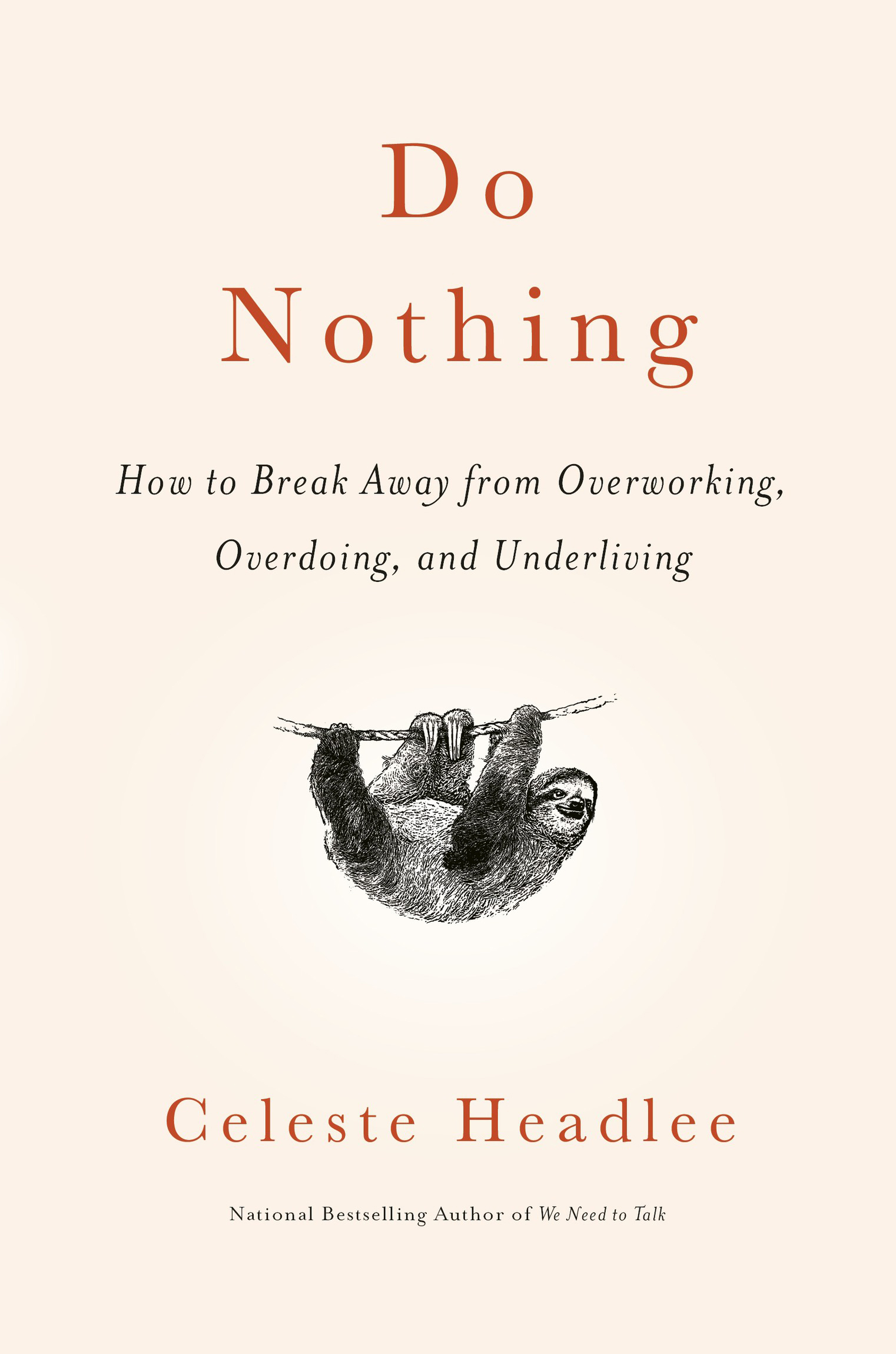
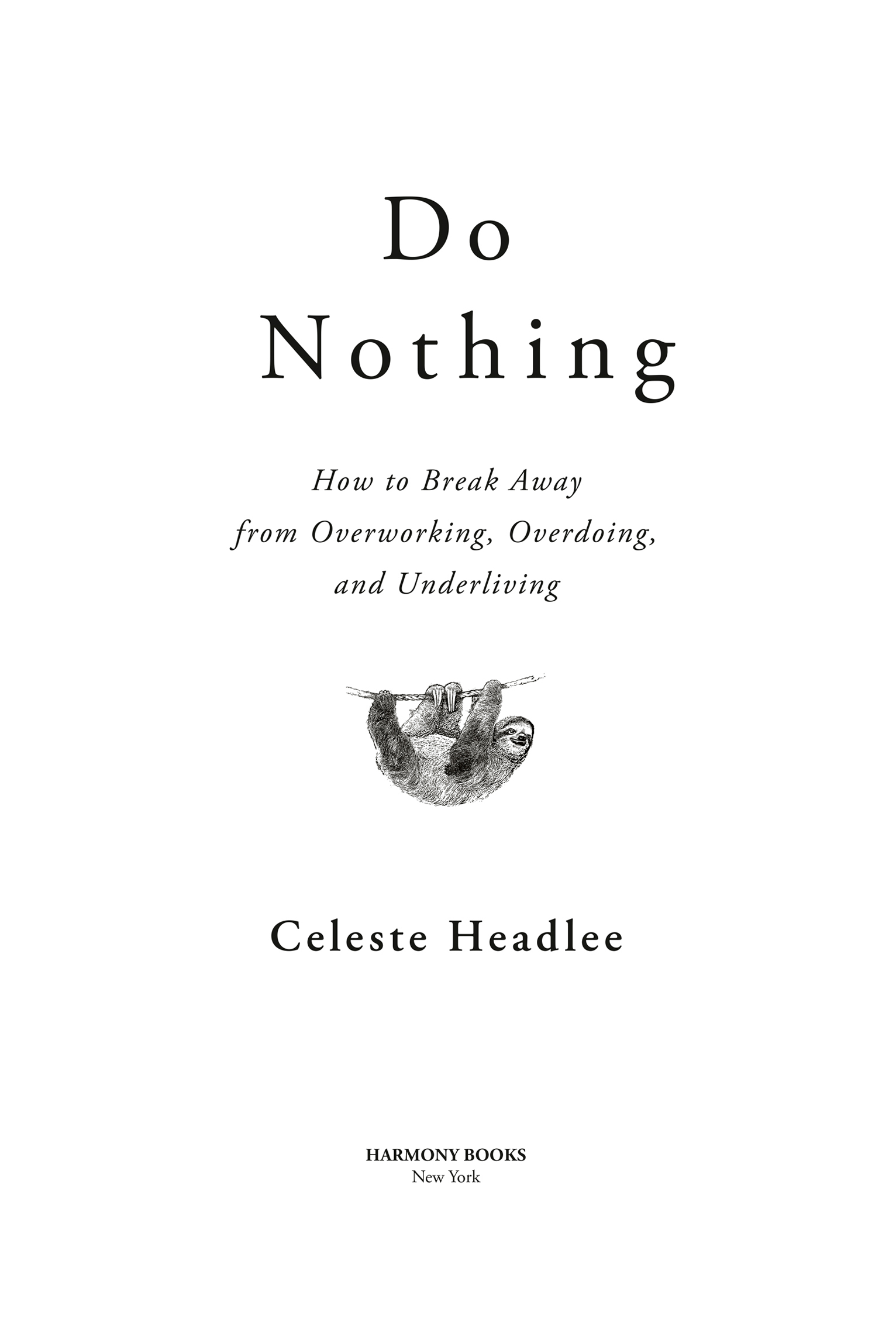
Copyright 2020 by Celeste Headlee
All rights reserved.
Published in the United States by Harmony Books, an imprint of Random House, a division of Penguin Random House LLC, New York.
harmonybooks.com
Harmony Books is a registered trademark, and the Circle colophon is a trademark of Penguin Random House LLC.
L IBRARY OF C ONGRESS C ATALOGING-IN- P UBLICATION D ATA
Names: Headlee, Celeste Anne, 1969 author.
Title: Do nothing : how to break away from overworking, overdoing, and underliving / Celeste Headlee.
Description: First edition. | New York : Harmony Books, [2020] | Includes bibliographical references and index. |
Identifiers: LCCN 2019023166 | ISBN 9781984824738 (hardcover) | ISBN
9781984824752 (paperback) | ISBN 9781984824745 (ebook)
Subjects: LCSH: Leisure. | WorkPsychological aspects. | Happiness.
Classification: LCC BJ1498 .H385 2020 | DDC 158dc23
LC record available at https://lccn.loc.gov/2019023166
ISBN9781984824738
International ISBN9780593138939
Ebook ISBN9781984824745
Cover design by Dan Donohue
v5.4
ep
It will be said that, while a little leisure is pleasant, men would not know how to fill their days if they had only four hours of work out of the twenty-four. In so far as this is true in the modern world, it is a condemnation of our civilization; it would not have been true at any earlier period. There was formerly a capacity for light-heartedness and play which has been to some extent inhibited by the cult of efficiency. The modern man thinks that everything ought to be done for the sake of something else, and never for its own sake.
BERTRAND RUSSELL,
In Praise of Idleness, 1932
W E ANSWER WORK EMAILS on Sunday night. We read endless articles about how to hack our brains to achieve more productivity. We crop our photos and use filters before we post them on social media to earn approval. We read only the first couple paragraphs of the articles we find interesting because we dont have time to read them in their entirety. We are overworked and overstressed, constantly dissatisfied, and reaching for a bar that keeps rising higher and higher. We are members of the cult of efficiency, and were killing ourselves with productivity.
The passage at the beginning of this Introduction was written in 1932, not long after the stock market crash of 1929, which caused the Great Depression. Russells description of the cult of efficiency predates World War II, the rise of rock and roll, the civil rights movement, and the dawn of the twenty-first century. More important, in my mind: It was written before the creation of the internet and smartphones and social media.
In other words, technology didnt create this cult; it simply added to an existing culture. For generations, we have made ourselves miserable while weve worked feverishly. We have driven ourselves for so long that weve forgotten where we are going, and have lost our capacity for light-heartedness and play.
Heres the bottom line: We are lonely, sick, and suicidal. Every year a new survey emerges showing more people are isolated and depressed than the year before. Its time to stop watching the trend move in the wrong direction while we throw up our hands in despair. Its time to figure out whats going wrong.
All my life, Ive been driven. That word has been used to describe me since elementary school.
Driven isnt always a compliment, especially when its used to describe a woman. Its not quite the same as ambitious, and it has a slightly different meaning than aggressive. Honestly, I think driven fits me fairly well. Ive always viewed all forward progress as inherently virtuous and good.
Even as a child, I made long to-do lists in my daily planner (I had a daily planner by the ripe old age of twelve) and made sure I finished more tasks than I added every day. When I was dieting, I motivated myself by saying I would weigh less tomorrow than today, even if it was only by a fraction of an ounce. If I spent an afternoon watching monster movies on TV, I felt guilty. I was terrified that someone would see me sitting idly on the couch and call me lazy.
My drive has helped me succeed in life. It sustained me through single parenthood, layoffs, and physical injury. Ive pushed myself to accomplish incredible amounts of work both at home and in my career. But at some point, drive became inextricably intertwined with dread: dread that all my work and effort would never be enough.
Eventually, I got lucky. I achieved much of what I wanted by the time I hit my forties, and I had time to stop, take a breath, and reexamine my way of life. While Id always been driven, Id also been exhausted, stressed, and overwhelmed. I assumed depletion was a natural side effect of being a single parent with multiple jobs and not enough money to cover all my expenses. My underlying assumption was that when I achieved financial stability, my stress would end.
That assumption, like so many assumptions, was wrong. My long-dreamed-of moment finally arrived a few years ago: I reached a level of stability that should have made me more comfortable, and I paid off my student loans (at last!). In fact, I paid off every debt I owed. I even had a respectable amount in savings and a real retirement account. I looked forward to nights of relaxation and relief. I expected to feel a lift, an easing of the stress Id suffered for two decades, but that relief never came.
My daily planner (still an old-school one with paper pages) was as packed with tasks as it was before Id paid off my debts, if not more so. My workload was as heavy with one job as it was when I had four. In the evenings, I was as worn out and exhausted as ever.
I realized it was not my circumstances that caused my stress but my habits. While my list of duties got shorter at the office, I found new duties to fill the empty space and called more meetings. At home, I decided I finally had time to make my own bread and learn Spanish. Instead of cooking the tried-and-true favorites in my recipe book, I searched the internet for new and exotic dishes that required an hour of driving in order to gather the ingredients. I agreed to serve on two advisory boards and chose to start writing a blog. And every week, I collapsed onto my couch on Friday night and thought about how I used to meet my friends for drinks, but now I didnt have time.
I had some tough questions for myself. Why? Why do I do this? Why do any of us do this?
For the past several years, Ive searched for the answer to those questions. Reading that eighty-seven-year-old essay from Bertrand Russell brought a flash of insight. I considered the fact that I did things rarely for their own sake, but in service to my drive to constantly improve and be productive. Far too many of us have been lured into the cult of efficiency. We are driven, but we long ago lost sight of what we were driving toward. We judge our days based on how efficient they are, not how fulfilling.
We search for the best method of doing everything, from holding meetings to exercising to barbecuing, and we are lured by the ultimate tools to improve our lives. We are like mechanics who build a car by assembling the top-of-the-line parts, focused only on finding the best of everything and not on whether those parts work well together. The end result is a car that struggles to start and keeps stalling out.
Font size:
Interval:
Bookmark:
Similar books «Do nothing : how to break away from overworking, overdoing, and underliving»
Look at similar books to Do nothing : how to break away from overworking, overdoing, and underliving. We have selected literature similar in name and meaning in the hope of providing readers with more options to find new, interesting, not yet read works.
Discussion, reviews of the book Do nothing : how to break away from overworking, overdoing, and underliving and just readers' own opinions. Leave your comments, write what you think about the work, its meaning or the main characters. Specify what exactly you liked and what you didn't like, and why you think so.

